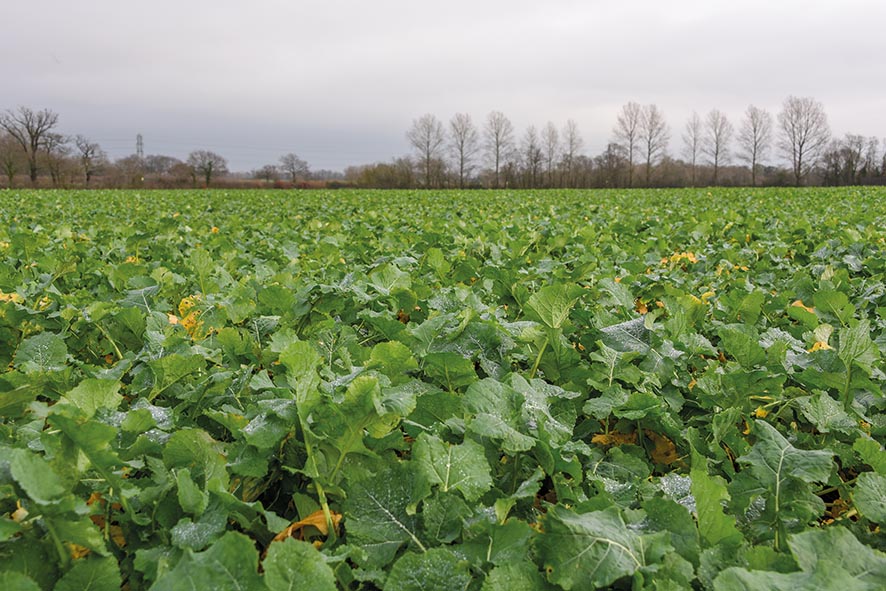Dry conditions ill-suited to pre-emergence herbicides as OSR growers search for moisture
2nd September 2022
With oilseed rape prices still topping £650/tonne and wheat harvests well advanced, many growers are understandably keen to get next year’s crop in the ground. But at the time of writing, only scattered showers had fallen across the UK – leaving soils dry and most drills stuck on standby.
Since neonicotinoids were banned, oilseed rape has been a crop requiring growers to mitigate pest risks wherever they can. Drilling into moisture as early as possible to allow crops to establish quickly and switching to a post-emergence autumn herbicide programme are two strategies that have found success.
While the weather has, so far, not played ball, industry predictions are still that an additional 100,000ha could be planted in the UK and Ireland this summer, with the war in Ukraine underpinning sustained vegetable oil demand.
Farmers returning to oilseed rape this summer are being urged to familiarise themselves with how weed control strategies have evolved in the past three years.
Faced with pressure from pests such as cabbage stem flea beetle, some arable farmers stopped growing oilseed rape – but a significant number are expected to build the crop back into their rotations this year.
Corteva Agriscience says those growers may not be familiar with recent advances in autumn weed control products which allow them to reduce their establishment risk and be more targeted in their approach to weed control.
Switching from a preventative to reactive autumn strategy allows growers to decide on their herbicide spend after assessing their crop’s establishment and visible weed pressure.
Targeting cleavers, cranesbill, poppy, shepherd’s purse and fumitory, Belkar herbicide offers an alternative to traditional approaches which rely on pre-emergence control.
Corteva’s oilseed rape herbicides category manager, John Sellars, said: “As an industry we have learnt a lot very quickly about how to establish the crop while reducing risks at the same time. This, combined with the attractive price of oilseed rape, will mean a significant number of farmers will return to the crop this year.
“Belkar has spearheaded a fundamental change in farmers’ strategies for controlling weeds, paving the way for a much more flexible approach to weed control in their oilseed rape.
“It’s a post-emergence product which allows growers to see the crop establish before deciding on their herbicide investment. It means they can tackle what is visible, and not spend on herbicides before they know how well the crop is going to emerge.”
Arylex active has been formulated with picloram to create Belkar and the product has a window from either 1st or 15th September (depending on the rate being used) through to 31st December.
Best practice for use
There are three treatment options which Corteva says have performed best in trials.
From two true leaves, an application at 0.25-litres/ha will take out the weeds which have germinated alongside the crop and, in some circumstances, that will be enough broad-leaved control before an application of Astrokerb (propyzamide + aminopyralid) or similar later on.
In high weed pressure situations where a second germination is visible, growers have the option of a second 0.25-litres/ha spray 2–4 weeks after the first application.
Depending on workloads, growers can wait until six true leaves of the crop – and after 15th September – to tackle bigger weeds at a rate of 0.5-litres/ha which will take care of the weeds going into the autumn.
Planning good stewardship in 2022
Although most oilseed rape crops are yet to emerge, plans for autumn and winter herbicide applications should be considered with good stewardship in mind.
“Product stewardship is extremely important to UK farming,” says Mr Sellars.
“It helps us sustain the crop protection products we have while protecting the environment at the same time.”
Corteva’s Kerb weather data is provided in a traffic light system, helping you to determine whether conditions are optimal for applying Kerb Flo 500 or AstroKerb this autumn.
For optimum control of blackgrass in oilseed rape, Kerb Flo 500 and Astrokerb both require the soil temperature to be 10ºC and falling.
“Soil moisture must be adequate but not wet to avoid causing run off. And applications must not be made if heavy rain is forecast,” Mr Sellars added.
Kerb weather data is available on the free Corteva Arable app which can be downloaded to any Apple or Android device. Alternatively, search Kerb weather data on www.corteva.co.uk

